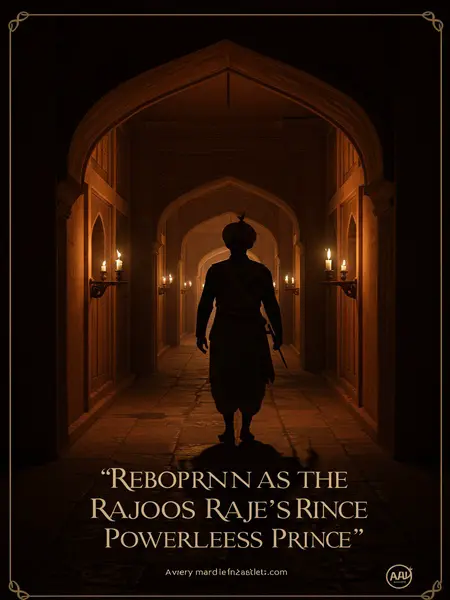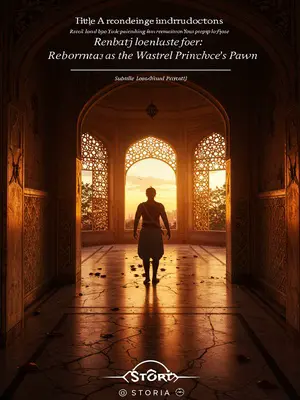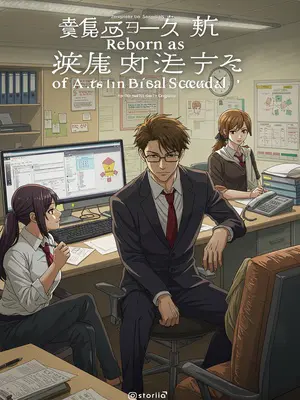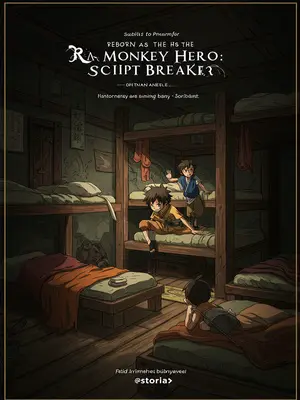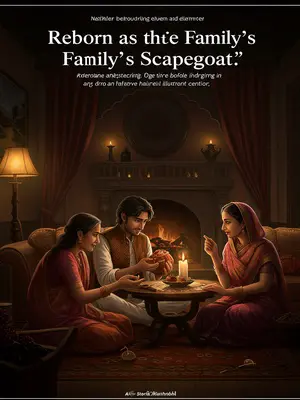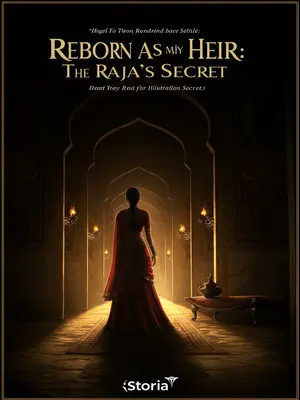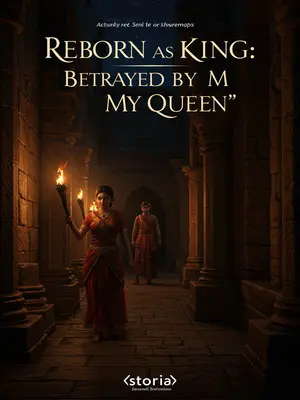Chapter 3: The Games of Authority
Ashoka: …
He sat in silent frustration, feet tapping against the cool marble floor, staring at a cracked photo of a forgotten ancestor. His thoughts, sharp as a javelin, circled the same question: "Kaise sudharenge yeh log?"
The difficulty just got harder, huh?
Still, it’s manageable. Bharat is vast—if only the people could be mobilised, a few new regiments could be trained. What is there to fear from the great powers?
He straightened his shoulders, remembering the stories of Shivaji Maharaj evading the Mughals, of Subhas Chandra Bose recruiting an army from scratch. "Yeh desh bahut bada hai. If the people wake up, koi rok nahi sakta."
But here’s the problem: to mobilise the people, the Zamindari must be abolished, and the concept of British Raj must be discarded…
He drummed his fingers, lips pursed. The realization was as bitter as neem juice: "Arrey, is this not just plain rebellion? Bol diya toh bas, sab khatam."
Isn’t that just rebellion?
He almost laughed aloud, a hollow, tired sound. The truth was sharp as a new blade—there would be no gentle transition. It would have to be a storm.
Ashoka considered his current identity: Rajeev Maurya, the Raja of Bharat.
He looked at his reflection in the brass pot, the shadows of the past swirling behind his eyes. "Main hi hoon Rajeev, toh main hi karunga sab kuch. No more waiting for miracles."
Silence—silence filled the Red Fort.
Even the pigeons seemed to sense the weight of destiny, cooing softly on the parapets. Somewhere in the bowels of the fort, a maid whispered a quick Hanuman Chalisa before lighting the lamps, hoping for protection in troubled times.
He took a deep breath, raised his brows. No big deal—just rebel against himself. As long as he had troops, any road was open.
He smirked, thinking, "Yeh toh apne aap se ladai hai. Kya farak padta hai?" He cracked his knuckles, letting the air buzz with nervous anticipation. If fate meant he had to topple himself, so be it.
A few days later, Ashoka was forced to face reality.
Reality arrived like a bucket of cold water in winter. The fort’s corridors echoed with the whispers of courtiers and the slap-slap of chappals on marble, as new rules and restrictions poured in faster than the monsoon rain.
Though he was nominally in power, all major military and state affairs, and appointments of first- and second-rank officials, required Rani Indira Devi’s approval. Even for routine matters, she had to see his orders first.
He felt the sting of every denial—petty, bureaucratic, suffocating. Stacks of paper grew on his desk, each stamped and signed, only to be returned with a red mark and a note: "Rani-saheb’s approval required." His authority felt as hollow as the old conch shell in the prayer room.
If the Rani was dissatisfied, she could halt anything instantly.
One sharp glance, and files would vanish, meetings would be rescheduled, even the cooks would start whispering instead of singing. He realized, with grudging respect, that true power was more subtle than any sword.
Ashoka could tolerate all this, but what he couldn’t bear was the constant standing in respect and greeting.
He remembered his own coronation—standing tall, sword raised to the sky. Now, every day he stood in endless darbars, the soles of his feet aching, bowing till his neck creaked. "Yeh sab natak kab tak chalega?" he would mutter, glancing at the smug faces of distant relatives.
What was this nonsense in the Raj? Standing in respect for everything, the Raja with nothing to do but stand, and he had to stand with utmost fear and respect.
It became a joke among the guards: "Sahab, standing is our main job!" Sometimes, Ashoka wished he could just sit and chat with the paanwala outside, far away from all this stiff protocol.
After enduring those days, Ashoka became numb, his mind full of: Dear Pitaji, listen to me, I have something important to say, please dismiss the attendants, and then I’ll punch you to death.
He would rehearse speeches in his mind, running through every scenario, every possibility. Yet, each time, all that emerged was a weak, dutiful smile. The anger simmered, but his hands remained at his side, fingers twitching uselessly.
Of course, he couldn’t do that.
Not in front of a hundred watchful eyes, not when every word was weighed and measured. The game of power was played with silent glances and polite half-truths, never with open rebellion.
He could only force a smile, stand and bow: Dear Pitaji, your son greets you.
He’d say it with as much sincerity as he could muster, voice trembling with suppressed laughter and hidden resentment. The words tasted like old medicine—necessary, but deeply unpleasant.
The tone was aggrieved, pained, mixed with both sorrow and joy, hard to describe—just like Emperor Ashoka calling out to his own father.
If only the palace walls could speak, they would tell tales of generations before him, each one wrestling with duty and desire. Sometimes, he imagined the old kings watching him, shaking their heads at his predicament.
Indira Devi:
She ruled not with a rod, but with the cool, unyielding weight of her presence. Her voice could silence a room, her raised eyebrow was enough to send seasoned ministers into a stammering panic. She was the keeper of every secret, every hidden thread that bound the family together. When she laughed, the whole palace sighed in relief; when she frowned, even the bravest courtiers quaked.
A few months later, Ashoka could no longer keep up the act, nor did he need to.
The pretense dropped away like the last leaves in autumn. Even the servants noticed—their greetings more subdued, their glances more frequent. The games of etiquette gave way to the hard realities of power.
Because Ashoka finally found clues in secret files and reports, which excited him—he felt he could do it again, that he had a chance to train troops.
He would pour over tattered files late into the night, the only sound the tick-tock of the old grandfather clock and the occasional mewing of a stray cat in the courtyard. The first hints of hope returned, a glimmer in his otherwise tired eyes.
In fact, not everyone at the top of the Raj was a fool. The Anglo-French forces had even looted the Somnath Temple—how could they not want a strong army?
He found allies in the most unexpected places—an old general with a fondness for chess, a bureaucrat who quoted Urdu poetry, a young officer eager to prove his worth. They met in secret, sharing plans over cups of steaming chai, careful not to attract the Rani’s ever-watchful gaze.
But when Indira Devi called on the Zamindars to form a new army, six Zamindar nobles died of fright that very day—no one wanted to endure the hardship of training.
The old nobles, with their hennaed beards and bulging paunches, feigned illness or vanished to their country estates. Rumors spread that one had taken up sanyas, another suddenly discovered a religious calling. "Arrey baba, army ka kaam humse nahi hoga," they’d mutter, waving away responsibility like a persistent fly.
These Zamindars spent their days flying pigeons, fighting cocks, drinking and smoking hookah when idle. When they ran out of money, they sold military rations and armour. Who would give up such a life to train in the army?
The palace courtyard was littered with empty hookah pots and discarded lottery tickets, the air thick with stories of easy money and lost honor. The very men who should have defended the land had become its greatest liability.
No problem—Indira Devi could still hire foreign instructors, bring in Western military experts, and if anyone learnt the skills, they could preside over training. Training a loyal local army for the Raj was not impossible.
The British, the French, even the odd Russian appeared, their uniforms crisp, their accents thick. Yet, for all their expertise, they could not teach loyalty where it had rotted away. The parade grounds remained empty, the rifles untouched, the flags drooping in the afternoon sun.
But military matters require talent, and among all the Zamindars, not a single competent student could be found.
In the evenings, Ashoka would walk the length of the training ground, boots crunching on gravel, watching the moon rise over empty barracks. The only company was the lonely call of the night watchman and the distant bark of a street dog.
If a new army really had to be trained, it could only rely on local people, training local troops… then what’s the point?
He pondered the irony: the solution was right in front of them, yet no one dared reach for it. The fear of losing power gripped the Raj like a fever—better to do nothing than to risk everything.
Foreigners only killed commoners, robbed some money, seized a bit of land, but local people truly threatened the Raj. Which was more serious? Indira Devi knew well.
She remembered the stories of the 1857 Mutiny—how it began with a whisper, a spark, and ended with a city in flames. The lessons of history were not lost on her, nor on those who clung to the old ways with trembling hands.
So the matter of training a new army was shelved, sealed away, and conveniently forgotten.
The files gathered dust, the parade grounds overgrown with wild grass. Life returned to its old patterns—tea in the gardens, gossip in the kitchens, the slow decline of a once-great house.
